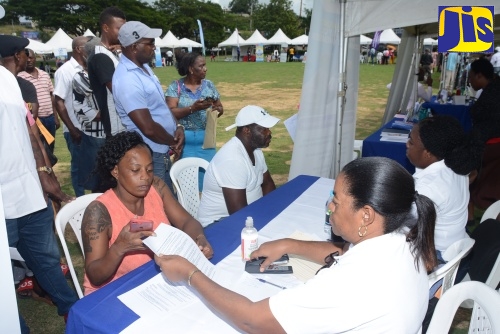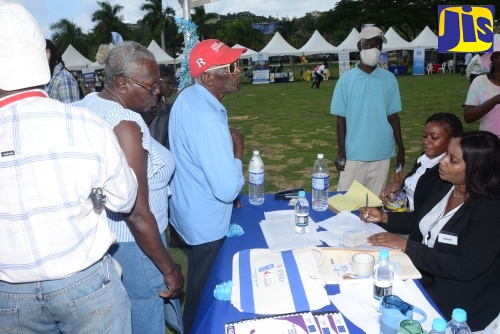Ensuring Full Inclusion for Persons with Disabilities
By: , January 26, 2024The Full Story
In the face of societal barriers, the Disabilities Act (2014) is an important tool in ensuring that persons with disabilities (PWDs) have equal rights, access and opportunities as other citizens.
The legislation, which came into effect on February 14, 2022, stands as a testament to the commitment by Government to safeguard and enhance the welfare of the disabled community.
It aims to promote the full and equal participation of PWDs in all aspects of national life and ensure their contribution to national development.
The legislation protects and promotes equal rights for the disabled, prohibits discrimination against them, and provides for access to education, employment and health services, public passenger vehicles, housing, among other things.
As the anniversary of the enactment approaches, there is opportunity to strengthen measures and further chip away at the barriers that block the full inclusion of PWDs.
Speaking with JIS News, Corporate Communications and Public Relations Manager of the Jamaica Council for Persons with Disabilities (JCPD), Adrienne Pinnock, says that “every Jamaican has a part to play in promoting a society that includes everyone”.
She notes that, often, persons without disability detach themselves from the challenges their fellow citizens face.
“We sometimes disassociate ourselves from the conversation because it’s not about us. While the Disabilities Act speaks to persons with disabilities, it also has information on responsibilities for persons who are non-disabled,” she points out.
Ms. Pinnock highlights the need to address discrimination, which continues to be a challenge for PWDs, and how persons can seek redress.
She says that discrimination not only involves overt prejudice but also the failure to provide “reasonable accommodation”.
The United Nations (UN) Convention on the Rights of Persons with Disabilities (UNCRPD) defines reasonable accommodation as “necessary and appropriate modification and adjustments not imposing a disproportionate or undue burden, where needed in a particular case, to ensure to persons with disabilities the enjoyment or exercise on an equal basis with others of all human rights and fundamental freedoms”.
This could entail providing special office equipment, instituting flexible working arrangements, providing documents in certain formats such as braille, rearranging office equipment to accommodate wheelchairs, and providing ramps, elevators or flat surfaces, etc.
“The Act speaks to ensuring that persons with disabilities are included, and where inclusion needs to be accommodated those accommodations are put in place. When an infrastructure is, for example, an old building, how do I increase access to ensure that I am not discriminating against an individual with a disability? That conversation needs to happen,” Ms. Pinnock notes.
She says that communication access is also key.
“When material and information is sent out, can persons with disabilities access that information, and what does that access look like?” Mrs. Pinnock points out.
With rights come responsibilities, and Ms. Pinnock says that in addition to knowing their rights, PWDs should also be aware of their responsibilities.
“You have a right to education, but you have a responsibly to attend school. So, while the Government is to ensure that schools are constructed in your area to provide for your education, parents have a responsibility to ensure that the students are accessing the education. You have the right to employment, but whether you create employment for yourself or you are placed into an unemployed situation, you have responsibilities that go with that,” she says.
Meanwhile, as Jamaica moves closer to becoming a more inclusive society for PWDs in keeping with the Disabilities Act, the JCPD has been collaborating with the Legal Aid Council (LAC) and the Ministry of Justice to improve access to justice and justice services.
In December, the LAC hosted its first justice fair aimed at PWDs in collaboration with the JCPD, with the Council providing support by identifying and addressing their unique needs, such as interpreting services and video monitors for the deaf, and volunteers to assist the blind and those with mobility challenges.


The United Nations Development Programme (UNDP)-funded event was appropriately themed ‘Justice without Barriers: Equal Access, Equal Opportunities’.
Executive Director of the LAC, Dian Watson, says the partnership is going a far way towards breaking down the barriers to justice faced by PWDs.
“This is under the Social Justice (So-JUST) Project, which aims to support the Government by increasing access to vulnerable groups, and they’ve been assisting the LAC to strengthen the delivery of service to persons in underserved communities.
“We believe that the disabled communities are underserved not because services are not offered but because they’re not taking advantage of them. So, if they are not coming to us in sufficient numbers, we are going out to them,” Mrs. Watson says.

The Disabilities Act is in keeping with the UNCRPD signed by Jamaica along with 60 other countries.
For more information on the Act, persons may visit the JCPD website at https://jcpd.gov.jm/.




